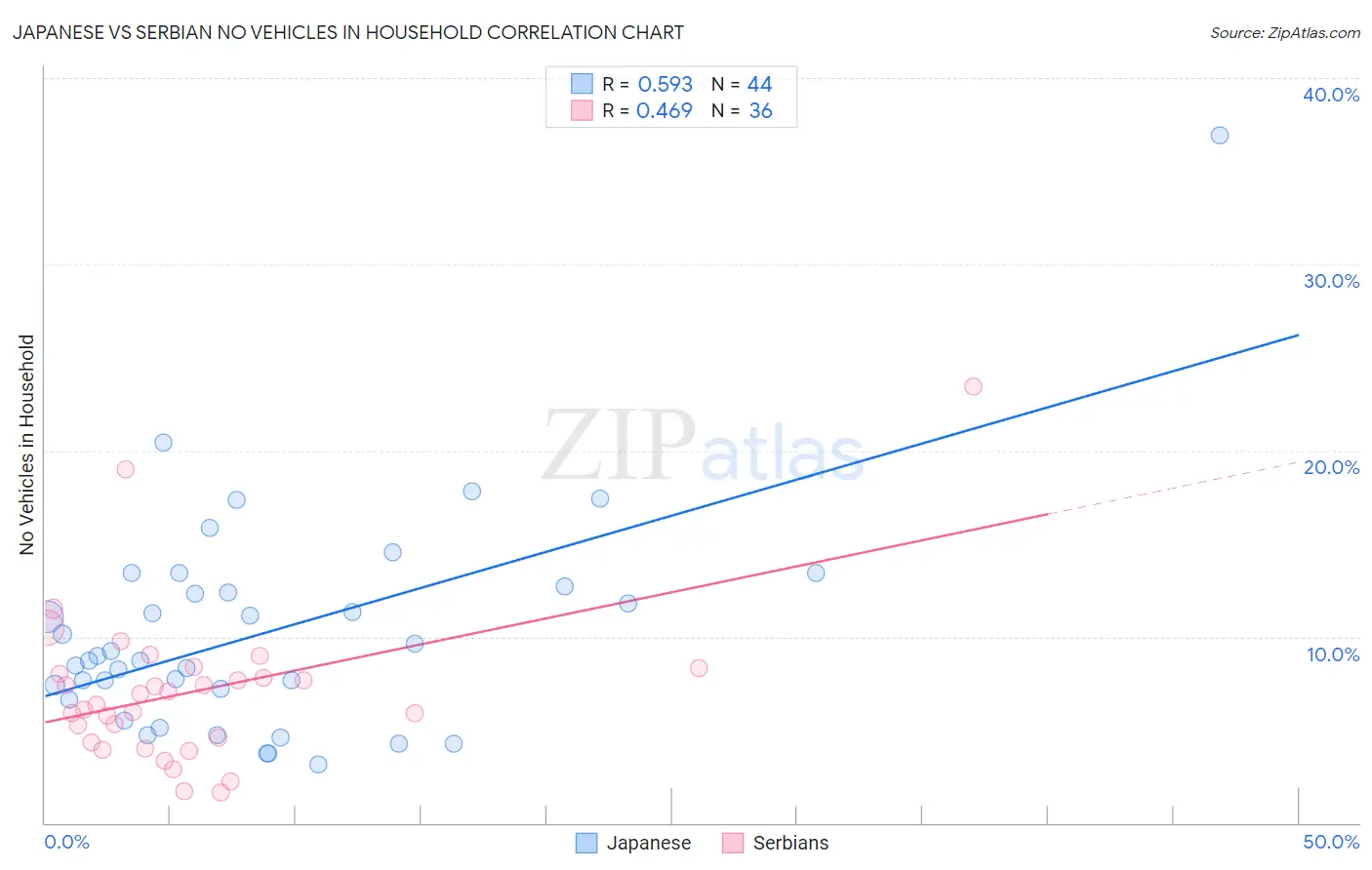Japanese vs Serbian No Vehicles in Household
COMPARE
Japanese
Serbian
No Vehicles in Household
No Vehicles in Household Comparison
Japanese
Serbians
9.4%
NO VEHICLES IN HOUSEHOLD
94.1/ 100
METRIC RATING
116th/ 347
METRIC RANK
9.4%
NO VEHICLES IN HOUSEHOLD
94.3/ 100
METRIC RATING
114th/ 347
METRIC RANK
Japanese vs Serbian No Vehicles in Household Correlation Chart
The statistical analysis conducted on geographies consisting of 248,891,204 people shows a substantial positive correlation between the proportion of Japanese and percentage of households with no vehicle available in the United States with a correlation coefficient (R) of 0.593 and weighted average of 9.4%. Similarly, the statistical analysis conducted on geographies consisting of 267,180,680 people shows a moderate positive correlation between the proportion of Serbians and percentage of households with no vehicle available in the United States with a correlation coefficient (R) of 0.469 and weighted average of 9.4%, a difference of 0.13%.

No Vehicles in Household Correlation Summary
| Measurement | Japanese | Serbian |
| Minimum | 3.2% | 1.6% |
| Maximum | 36.9% | 23.5% |
| Range | 33.7% | 21.9% |
| Mean | 10.2% | 7.1% |
| Median | 8.9% | 6.6% |
| Interquartile 25% (IQ1) | 6.9% | 4.5% |
| Interquartile 75% (IQ3) | 12.6% | 8.2% |
| Interquartile Range (IQR) | 5.6% | 3.7% |
| Standard Deviation (Sample) | 5.9% | 4.2% |
| Standard Deviation (Population) | 5.8% | 4.2% |
Demographics Similar to Japanese and Serbians by No Vehicles in Household
In terms of no vehicles in household, the demographic groups most similar to Japanese are Navajo (9.4%, a difference of 0.070%), Chippewa (9.4%, a difference of 0.17%), Immigrants from Netherlands (9.4%, a difference of 0.56%), Armenian (9.4%, a difference of 0.66%), and Greek (9.5%, a difference of 0.72%). Similarly, the demographic groups most similar to Serbians are Navajo (9.4%, a difference of 0.070%), Chippewa (9.4%, a difference of 0.30%), Immigrants from Netherlands (9.4%, a difference of 0.43%), Armenian (9.4%, a difference of 0.52%), and Immigrants from Kuwait (9.4%, a difference of 0.61%).
| Demographics | Rating | Rank | No Vehicles in Household |
| Spanish Americans | 97.9 /100 | #105 | Exceptional 9.1% |
| Laotians | 97.8 /100 | #106 | Exceptional 9.1% |
| Hispanics or Latinos | 97.7 /100 | #107 | Exceptional 9.1% |
| Mexican American Indians | 97.6 /100 | #108 | Exceptional 9.1% |
| Maltese | 97.6 /100 | #109 | Exceptional 9.1% |
| Delaware | 97.2 /100 | #110 | Exceptional 9.2% |
| Immigrants | Kuwait | 95.1 /100 | #111 | Exceptional 9.4% |
| Armenians | 95.0 /100 | #112 | Exceptional 9.4% |
| Immigrants | Netherlands | 94.8 /100 | #113 | Exceptional 9.4% |
| Serbians | 94.3 /100 | #114 | Exceptional 9.4% |
| Navajo | 94.2 /100 | #115 | Exceptional 9.4% |
| Japanese | 94.1 /100 | #116 | Exceptional 9.4% |
| Chippewa | 93.8 /100 | #117 | Exceptional 9.4% |
| Greeks | 92.9 /100 | #118 | Exceptional 9.5% |
| Fijians | 92.7 /100 | #119 | Exceptional 9.5% |
| Immigrants | Thailand | 92.6 /100 | #120 | Exceptional 9.5% |
| Puget Sound Salish | 92.4 /100 | #121 | Exceptional 9.5% |
| Costa Ricans | 92.3 /100 | #122 | Exceptional 9.5% |
| Blackfeet | 91.4 /100 | #123 | Exceptional 9.6% |
| Immigrants | Korea | 90.9 /100 | #124 | Exceptional 9.6% |
| Immigrants | Cameroon | 90.6 /100 | #125 | Exceptional 9.6% |